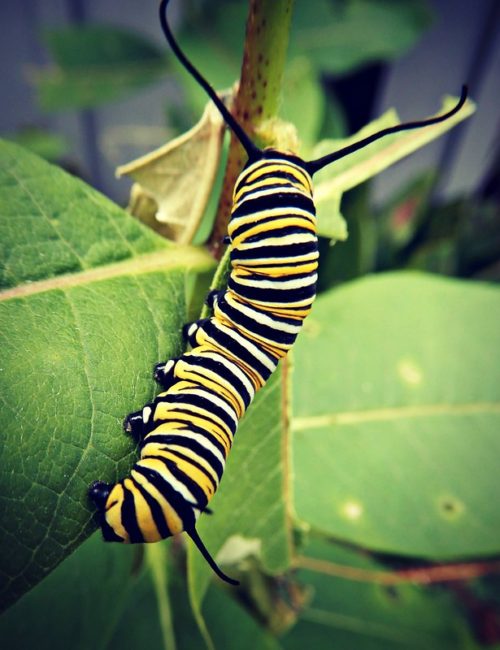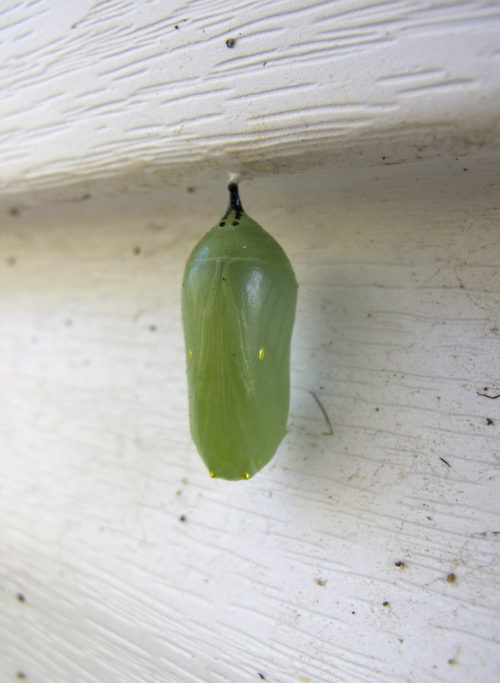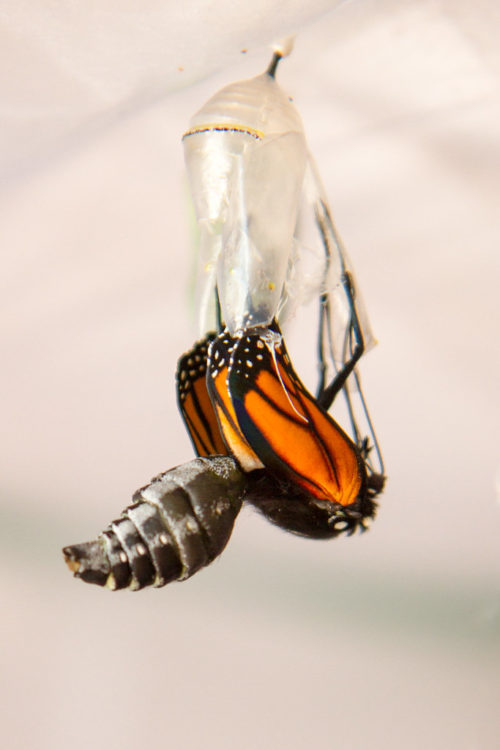The Very Hungry Grad Student: Consuming, Digesting, and Applying Knowledge in an Interdisciplinary Field
Megan Munkacsy · | Applying Science | Learning Science | 9 commentsBy: Megan Munkacsy
In the first 10-14 days of a monarch caterpillar's life, it will eat 200 times it's body weight in milkweed leaves1. That's the equivalent of an average house cat eating over 111 sixteen-pound bags of cat food in two weeks or less.
Once fed, the caterpillar hangs upside down and sheds its last skin as a caterpillar, turning in on itself to liquify all of its insides into stem cells, and rebuild2.
This past week, the 2019 class of Environment and Society liquified our knowledge after nine weeks of binging on information, and worked to restructure our understandings and spread our wings.

Step One: Consumption
Yes, the caterpillar transforming into a butterfly metaphor might be overdone, but I'll be gosh darned if every person in this class doesn't feel as if they've increased their understanding of coupled human and natural systems at least 200-fold. Thus far, we've covered everything from Thoreau to environmental cost benefit analyses, and from sustainability and safe operating spaces to scientific culture and environmental justice.
Personally, I came into this class feeling like I had a decent grasp on the interdisciplinary work of connecting environmental and societal issues. With a background in fisheries, I had worked on projects in the past that tried to gauge community feelings towards policy, or willingness to engage in science. This class pretty quickly showed me how naive I was, though, and less than two months later I, and it seems many of my classmates, am just beginning to take stock of it all.

Step Two: Digestion
Up until this week, our class had been covering a new field (or two!), all which could be considered an overlap between social and environmental sciences. The entirety of the past week's class was spent reviewing each mid-term essay we submitted to analyze, critique, and synthesize the fields of research we have covered so far. While some students re-categorized readings, others broke them down by philosophy or motivation. Considering the spectrum of topics covered this semester, different favorites and least favorites stuck out for each person.
Generally, the topic of sustainability seemed to challenge people. The definition felt very lose, and many students struggled to understand sustainability as a field, instead conceptualizing it as a goal or an idea to work towards. What makes something sustainable? Maybe how reusable something is? How recyclable it is? How much it provides for a future generation? How much protection it provides? Through discussion, we learned about the concept of Oxfam's sustainability doughnut3, but is that really a field?
Further, environmental economics had a controversial role in our class, with a majority feeling it directs environmental thinking in the wrong direction and a slightly smaller minority feeling it is a powerful tool to implementing environmental protections. This debate is a common one even outside of our class, as can be heard in this RadioLab episode where they talk about environmental economics, pricing the services of nature, and what happens when those services cease, such as in the Parable of the Bees.

Your browser does not support the audio element.
Personally, I must admit that I'm in the camp of seeing environmental economics as a powerful tool, but I understand the sentiment that putting a dollar sign next to nature can be limiting, and can lose some of the intrinsic value we feel towards nature.
Overall, the class tended to agree across the board that just as sustainability (while fuzzy) felt widely applicable, including environmental justice and equity in all coupled human and natural systems work is critical. Coming into a community of any kind, even your own, as a researcher carries a professional weight with it that should not be ignored. At the same time, acknowledging the history with which a community has grown and developed is critical to providing sound and useful research. You will never know if your results are skewed due to misunderstanding or miscommunication if you do not come in with empathy and open to admitting mistakes and learning.

Step Three: The Rebirth
One student mentioned how motivations for people who want to change are very different depending on their perspective and lived experiences, and those same factors influence how they approach issues. This seems like the pinnacle point on which our class is based.
To understand the environment that a hypothetical community is referencing, you need ecology. To understand the cultural beliefs they bring to the table, you need anthropology. To understand how their goals fit into a world available to the future, you need sustainability. To motivate actions towards those goals, you need economics. To ensure understanding of research, you need science and technology studies, and to make sure that your research is just, useful, and works to effectively organize power, you need both environmental justice and political science. Commonly across all these fields, a good researcher in our line of work needs empathy, self-reflection, and a willingness to be honest and learn.
One last caterpillar fact. Did you know, that when researchers taught caterpillars to avoid certain sensory experiences, they remembered that response through metamorphosis4? Even through a transformation so extreme as to liquefy all of its insides, caterpillars carry with them the memory of their initial training.
The amount of information we've covered in class so far has been immense, and we've only skimmed the surface. Having eaten at least our weight in information and digested it, it's time to continue forward. It may seem overwhelming to hang from the nexus of so many branches and try to build something from a pod with a little bit of everything mixed together. However, when researchers put in the work, a structured, powerful, and beautifully mosaic interdisciplinary field such as Environment and Society can be born, and can be used to develop critical research.
References:
1. Zippykid. (2011, March 25). Monarch Caterpillars Have Supersized Appetites, Eat 200X their Weight in Milkweed Leaves.
2. Wilson, T. V. (2008, April 28). How Caterpillars Work.
3. Raworth, K., & Oxfam. (2012). A Safe and Just Space for Humanity: Can We Live Inside the Doughnut?.
4 Blackiston, D. J., Casey, E. S., & Weiss, M. R. (2008). Retention of Memory through Metamorphosis: Can a Moth Remember What It Learned As a Caterpillar?.
About the author
Megan Munkacsy

Megan Munkacsy is a master's student in the University of Maryland’s Marine Estuarine Environmental Sciences, Environment and Society program. She works with Dr. Lisa Wainger of the University of Maryland Center for Environmental Science, Chesapeake Biological Laboratory. Meg is facilitating input from stakeholders throughout the Bay to develop a geospatial tool that presents a value-based hierarchy of policy options addressing the conflict between recovering submerged aquatic vegetation populations, an expanding oyster aquaculture industry, and other Bay uses.
Next Post > Jamie's Australian Adventures
Comments
-
Andrea Miralles 6 years ago
I think the way you framed this as us digesting and rebuilding puts what I've been feeling the last couple of month into words in such an accurate way. You have a way with words lady- this made me think and laugh lots!
Thanks :)
-
Hamani Wilson 6 years ago
Megan,
You had a difficult task having your blog week follow the critics and you did a great job unraveling what we've had to learn to this point. I look forward to liquifying more knowledge with you and the rest of the class.
Hamani -
Hamani Wilson 6 years ago
Nailed the in particular. "Commonly across all these fields, a good researcher in our line of work needs empathy, self-reflection, and a willingness to be honest and learn."
forgot to add to original post. lol
Hamani -
Michael Paolisso 6 years ago
Megan,
I thoroughly enjoyed this blog. Listening to radio lab as I type. Liquifying knowledge? I like it. You are all spreading your intellectual wings! I hope you all keep stretching.
Michael -
Taylor Gedeon 6 years ago
Awesome hungry caterpillar example! I definitely think we have "eaten at least our weight in information and digested it..." after last week's class and paper.
-
Kayle Krieg 6 years ago
Like everyone else, I love the caterpillar analogy! I may be a bit behind everyone else, I have definitely eaten the new stuff, but still digesting! Hopefully I will get to rebuilding before the end of the semester.
-
Enid Munoz 6 years ago
This is a very creative approach to synthesize this lecture. That's right we're hungry for knowledge! Great job!
-
Alison Thieme 6 years ago
Every week I think I’m full, take a few days to digest all the new information, and then am ready for more. Really enjoying this class and your caterpillar idea.
-
Isabel Sullivan 6 years ago
I love the progression with the caterpillar theme! These stages are very true to graduate school right now. I also liked the addition of the RadioLab! This summary was a great way to explain how our semester has been! Great job